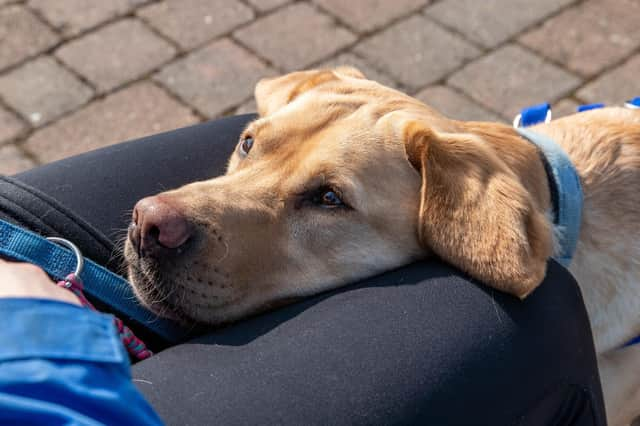Gentle Rodney is set to become a real life-changer


The autism assistance dog, currently being trained by Sheffield-based national charity Support Dogs, has recently moved from their training centre in Brightside to live with the family where it is expected he will spend his working life.
Rodney is still under the strict supervision of his instructor Becky Cochran, who reports that he has settled well into family life and is learning how to be an autism assistance dog for a young girl who lives in Nottingham.
Advertisement
Hide AdAdvertisement
Hide AdSays Becky: “Rodney is very laid back and takes everything in his stride. The family have been to Gulliver’s World recently and Rodney helped them to have a lovely day out and has made family outings a more pleasurable experience for everyone.”
A laid-back personality is an essential quality in an autism assistance dog, as life for a family with a child with autism can be stressful. Routine shopping trips, days out or visits to friends and family become fraught with challenges. Family life is disrupted, siblings feel they are missing out and every outing has the potential for disaster.
But with the help of an autism assistance dog, many families find their lives are transformed. Having a dog makes a huge difference and a properly trained dog can benefit the whole family.
The most important way an autism assistance dog can help children with autism is to keep them safe, as many youngsters have no sense of danger and have a tendency to bolt. Outside the home the child is attached to the dog’s jacket with a belt and with a handle to hold. The parent holds the lead and gives the commands, and if the child attempts to run, the dog is taught to brace and so keep the child safe.
Advertisement
Hide AdAdvertisement
Hide AdAt home, an autism assistance dog can help reduce stress and anxiety levels for the whole family and reduce challenging behaviour at home. “When visitors come to the house, the child will see that the dog is friendly to them, and that encourages the child to interact with them too,” says Rita Howson, chief executive of Support Dogs, which is celebrating its 30th anniversary this year.
“The dog can also help reduce obsessive routines and repetitive behaviour. We can teach the dog to interrupt that behaviour by doing gentle nudges. Other children respond well to gentle pressure - we can teach the dog to lie across their legs or rest its head on the child’s lap.”
Children with autism find it difficult to form close relationships with other humans and as a result their dog becomes a major focus in their life. They form very close bonds with their dogs over many years, with many parents describing the dog as their child’s best friend.
If all goes well, Rodney and his young client will officially become a Support Dogs’ autism assistance dog partnership by early next year. The pair can expect a long working relationship – but Rodney will also have plenty of time for fun and being a just a dog.
Advertisement
Hide AdAdvertisement
Hide AdAdds Becky: “Rodney is a really loving boy, loves to have a cuddle and play ball in the garden. He settles well and has a calming influence on the little girl when needed. But he still loves to be a silly puppy when playing with other dogs!”
Support Dogs trains assistance dogs for children and adults with epilepsy, autism and a range of serious medical conditions, enabling them to lead safer, more independent lives.
It is currently looking for volunteers to look after its puppies before they start full-time training. If you are interested and live within 45 minutes’ drive of Sheffield, they would love to hear from you on 0114 2617800.